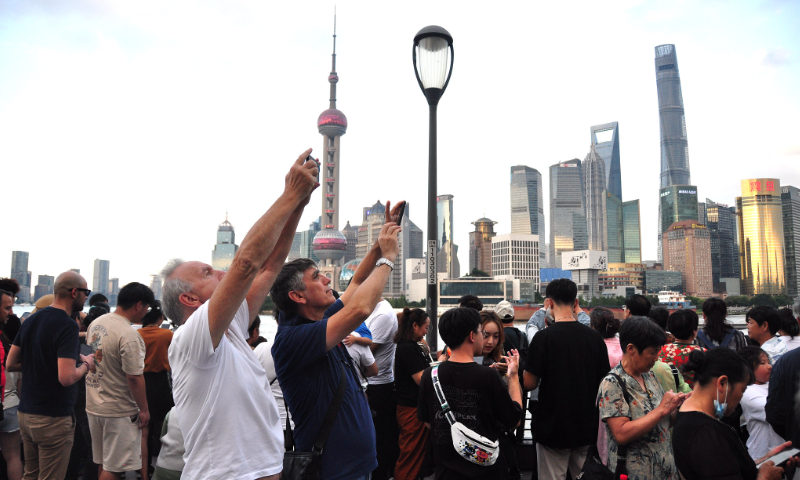It is necessary to expose the 'foreign ghosts' spreading rumors about Chinese economy: Global Times editorial

Has China's Shanghai turned into a "ghost town"? This "nonsense" that can be easily distinguished by both Chinese people and foreigners with basic common sense has astonishingly become the headline of an article in the well-established American news magazine, Newsweek. There are indeed people playing tricks behind this absurd situation, and it's necessary for us to expose these "foreign ghosts" and bring them into the light of day.
Newsweek probably wouldn't be so ignorant to genuinely believe that Shanghai is becoming a "ghost town." Therefore, it appended a question mark to the headline, likely to deflect responsibility for spreading false information and rumors. However, the magazine cited three photos from social platform X (formerly known as Twitter), which were taken in the Lujiazui financial district of Shanghai. It didn't bother to verify the authenticity of these photos, when and under what circumstances they were taken. Instead, it simply adopted the exaggerated claims made by the photo uploader, suggesting that the desolate roads and an empty Starbucks in the photos indicate "deep trouble" for the Chinese economy. Such an approach is not just unprofessional but is essentially a form of rumor-mongering with a certain level of "technical sophistication."
The report begins by stating that the internet erupted in debate about whether Shanghai has turned into a "ghost town" following a "viral tweet showing empty streets." It then acknowledges that many residents have disputed this notion. However, it quickly shifts the focus to people's concerns about the Chinese economy. In fact, there should be no debate about whether Shanghai, China's megacity with a population of 25 million permanent residents, is a "ghost town." Only those who are blind, deaf, or mentally impaired don't comprehend this fact.
Discerning individuals can clearly see that the main focus of Newsweek is to sensationalize the economic downturn in China, a trend that has been particularly popular in Western media recently. Newsweek has caught onto a sensational gimmick and has disregarded its own image. By combining the visually shocking photos with the provocative term "ghost town," it has created a strong psychological suggestion that "China's economy is in trouble." It must be said that this kind of misinformation operates on a more "sophisticated" level.
If only Newsweek is doing this, then it is an isolated case, indicating the media outlet's problematic professional ethics and the negative impact it caused is not significant. However, starting from March or April this year, not only Newsweek but also other US and Western media outlets have been selectively using some specific data from a certain point or in a certain field to generalize, and even fabricate information to undermine, the Chinese economy. This is a coordinated and large-scale campaign, with consistent steps, intense actions, and extensive content, which is rare in recent years. Can we say that this is a coincidence?
In the field of economics, there is a term called narrative economics, which uses storytelling to influence judgments, even at the cost of creating false information, to undermine the morale and confidence of the target and attempt to deter foreign investment, thereby having a substantial impact on the economy. The US has openly regarded China as its biggest competitor and even treats China as an imaginary enemy in many practical aspects. We cannot expect it to engage in fair competition with China. In order to win this "competition" initiated by itself, the US often resorts to any possible means. This perspective can explain the phenomenon in which the US is badmouthing the Chinese economy in a collective manner and can also roughly predict the US' future actions toward China, indicating that it aligns with the basic facts.
From this perspective, including the rumors of Shanghai being a "ghost city," all kinds of negative comments are actually a cognitive and psychological warfare launched by the US and the West against China, targeting the confidence in China's economy both domestically and internationally. In their view, Shanghai is an international metropolis, so smearing its reputation will deal a "heavy blow." However, this time, Newsweek has hit the wrong target. Enterprises have the most sensitive instincts. If even the stores in Lujiazui are "empty," why did Starbucks announce last month that it would invest 1.5 billion yuan ($206 million) to establish an innovation and technology center in China and why did it plan to have about 9,000 China outlets by 2025? If China's economy is facing a long-term crisis, why are American technology companies still striving to expand their presence in China despite various restrictions?
For China, some people from the outside creating false information about China's economy is despicable and condemnable. We must first maintain composure and judgment, not be swayed by malicious rumors and manipulations, and concentrate on doing our own things well. Let the fact that China's economy is thriving and moving forward vigorously serve as the most powerful refutation against them.